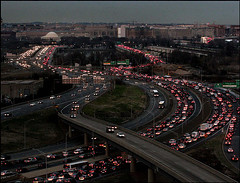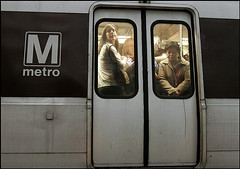Virginia House reconsidering WMATA sales tax and thoughts about DC subsidies of Maryland and Virginia
 Photo: Nikki Kahn, The Washington Post. Traffic congestion heading north on 395 from Route 1 is shown on Wednesday, February 15, 2006, in Arlington, Virginia.
Photo: Nikki Kahn, The Washington Post. Traffic congestion heading north on 395 from Route 1 is shown on Wednesday, February 15, 2006, in Arlington, Virginia.Today's Post reports in "House Panel to Take Up Va. Funding Bill for Metro: Move Comes After Measure Failed in Subcommittee" (likely in response to opprobrium heaped upon the "Northern Virginia" legislators from Prince William and Caroline Counties, and the city of Manassas) that the House Finance Subcomittee is reconsidering the bill, saving face by claiming that it has been rewritten to reflect their concerns.
For the bill text go the Virginia General Assembly website.
2. Sam Smith, publisher and writer of the Progressive Review and the online City Desk, has a different take on WMATA funding. While I don't agree with him that dedicated revenues from sales taxes are a terrible idea (BART in San Francisco has done this for decades) as always he makes great points.
 Courthouse Metro Station. Washington Post photo by Nikki Kahn.
Courthouse Metro Station. Washington Post photo by Nikki Kahn.His point about intelligent jurisdictions like Arlington County's use of the subway to attract federal agencies and other businesses to their communities at the expense of DC is quite accurate.
Years ago I heard Bob Brosnan, Arlington County's Planning Director give a presentation and afterwards I told him he needed to retitle it to "How to Kill DC." But the fact is, poor planning in DC, and of course antipathy towards the city, provided plenty of opportunities to suburban business development regardless.
The blog entry is reprinted below:
AS WE HAVE argued from the start, Metro has been a poor deal for DC for a number of reasons:
- DC heavily subsidized suburban mass transit by dumping its remaining highway funds into the system after the freeways were stopped.
- At the then disparity between heavy and light rail costs, we could have had an 1000 mile light rail system for what the subway cost. This wouldn't be true today because as subways lost their allure (thanks in part to the Metro experience) and as light rail became more appealing, prices of the latter went up.
- The subway has removed jobs, businesses, and tourist facilities from the city and has made it possible for ever larger number of suburbanites to exploit DC tax free (thanks to the ban on a commuter tax). DC now has the greatest percentage increase in daytime population owing to commuters of any city in the country but it fails to benefit from this increase commensurate to the costs involved. In fact, jobs for DC residents have actually declined since the construction of Metro.
- The subway did not compete with the automobile as promised. In fact, it increased street traffic by attracting new development to which only a portion of the workers came by subway. The rest added to the street traffic.
- While the subway did not compete with the automobile, it did a fine job of competing with buses, first by building the system along the most heavily ridden bus lines (which were then eliminated) and second by making the bus system a feeder into the subway rather than serving its natural constituency. Finally, the system has treated the DC bus system like an unwanted child.
All this is absolutely true and absolutely verbotem to talk about in polite DC society.
Now there are plans for a dedicated tax for the Metro system under which the city would pay 37% of the cost of a system that is largely used to bring non-taxpaying suburbanites into the city. Leaving aside the fact that dedicated taxes are a bad approach to public budgeting (it strips legislative bodies of their democratic rights), before any such plan is approved we need actual proof that 37% of the cost of Metro is due to ridership by DC residents. Otherwise it is, as it appears, another suburban con ripping off the city.
Index Keywords: transit



0 Comments:
Post a Comment
<< Home